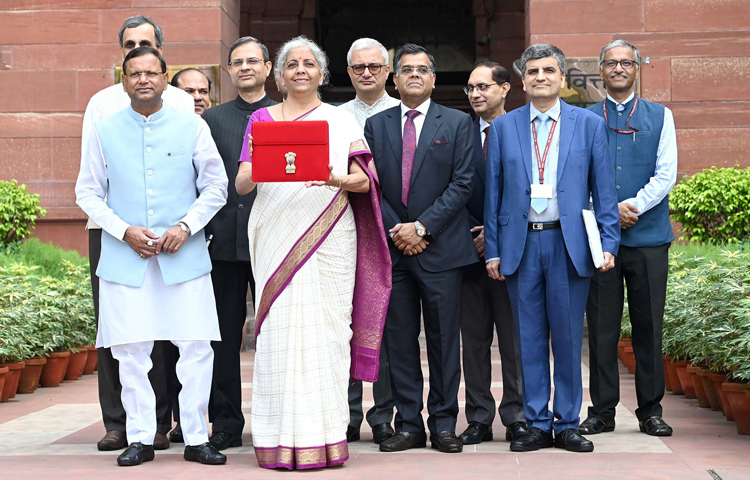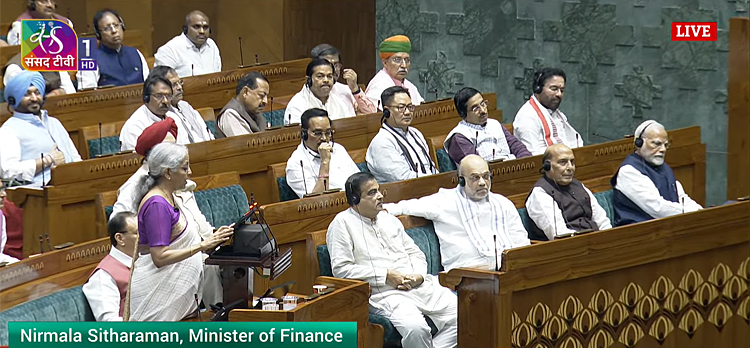INDIAN ARMED FORCES CHIEFS ON OUR RELENTLESS AND FOCUSED PUBLISHING EFFORTS

The insightful articles, inspiring narrations and analytical perspectives presented by the Editorial Team, establish an alluring connect with the reader. My compliments and best wishes to SP Guide Publications.

"Over the past 60 years, the growth of SP Guide Publications has mirrored the rising stature of Indian Navy. Its well-researched and informative magazines on Defence and Aerospace sector have served to shape an educated opinion of our military personnel, policy makers and the public alike. I wish SP's Publication team continued success, fair winds and following seas in all future endeavour!"

Since, its inception in 1964, SP Guide Publications has consistently demonstrated commitment to high-quality journalism in the aerospace and defence sectors, earning a well-deserved reputation as Asia's largest media house in this domain. I wish SP Guide Publications continued success in its pursuit of excellence.
First Defence Budget of NDA 3.0
In her seventh Union Budget presentation on July 23, 2024, Finance Minister Nirmala Sitharaman announced no change in defence allocation from the ₹6.21 lakh crore allocated in the interim budget five months earlier, despite threats to India's national security increasing by the day
 |
The Author is Former Director General of Information Systems and A Special Forces Veteran, Indian Army |

On February 1, 2024, Finance Minister Nirmala Sitharaman presented an Interim Union Budget 2024-2025, terming it the First Budget in 'Amrit Kaal'. The allocation of Defence Budget to the Ministry of Defence (MoD) in this interim budget was ₹6.21 lakh crore, which was described as a "record allocation" by the defence minister. The irony is that while the media keeps showing record increase in annual defence allocations every year, the defence budgets turn out to be negative in "actual terms".
With India already a $5 trillion economy and aiming for $7 trillion by 2030, an annual defence budget of 4-5 percent of GDP is needed through the next decade due to increasing threats, including the China-Pakistan threat and the need for advanced military capabilities
It was brought out in these columns on June 11, 2024 that with India already a $5 trillion economy and aiming for $7 trillion by 2030, an annual defence budget of 4-5 percent of GDP is needed through the next decadedue to:
- China-Pak threat - now also extended to the maritime domain;
- Neighbours like Nepal and Maldives have drawn closer to China;
- Ukraine-like hi-tech battlefield is what we will face in next war with China;
- Credible capabilities in space, EW, AI, Cyber, long-range vectors, hypersonic, drones and TNWs are required vis'-a-vis China;
- Capability-wise Army has voids and holds some obsolete equipment;
- We are short of fighter squadrons, underwater and minesweeping capabilities, and number of SSBNs needs to be increased.
It was also brought out that we urgently need a 'potent' national security strategy (covering nuclear, conventional, hybrid, and unconventional aspects) to establish credible deterrence, which should also be demonstrated to establish its credibility. Attention was also drawn to the fact that defence allocations by all countries faced with the rising China threat has increased exponentially and Japan, which doesn't even have a land border with China, has made an unprecedented hike in defence allocations in the last two years.
Speaking at a seminar organised by the Centre for Air Power Studies at New Delhi on July 19, 2024, Vice Chief of Air Staff Air Marshal A.P. Singh said Atmanirbharta is what we are riding on, but this cannot be at the cost of the nation's defence. The nation's defence comes first and foremost, he stressed while flagging that the rate at which they are getting equipment at the moment is "too low". This also indicated the tortoise pace against the combat capabilities we urgently require. According to a former Vice Chief of Army Staff, "We are certainly lagging behind both the adversaries. We need a lot of funds".

An article dated July 21, 2024, said that the Modi 3.0 should reflect India's status as the 5th largest economy, defence allocation is crucial for enhancing military capabilities and ensuring national security and it is expected that the upcoming budget will continue to prioritise the country's defence needs.
In the above backdrop, in her seventh Union Budget presentation in Parliament by Finance Minister Nirmala Sitharaman on July 23, 2024, there is little change in defence allocation from the ₹6.21 lakh crore announced in the interim budget five months earlier on February 1, despite threats to India's national security increasing by the day. This also includes ₹1,41,308 crore towards defence pensions which indicates that the government has no intention of honoring its commitment to One Rank One Pension (OROP) which is long overdue.
The issue of having a National Security Strategy appears to have been dismissed with the Chief of Defence Staff stating that a "written" national security strategy is unnecessary
Have our policy makers developed a false sense of security with rhetorical statements like capturing Pakistan occupied Kashmir (POK) while there is a big surge of terrorism in J&K. In fact, terrorism in the instant case is a misnomer; which actually is "low intensity conflict (LIC) coupled with jihad" being waged against us by Pakistan and other international actors, as elucidated by a senior veteran.
The political complacency has exacted anger on social media, for example, a post on X says soldiers are being killed daily inside our territory, guided missile frigate sinking in the dockyard, Tejas LCA delayed because of lack of engines, the three forces collapsing under the bureaucracy and sinking of INS 'Brahmaputra' perfectly capturing the state of Indian Armed Forces.
Apparently, the government doesn't even want to scrap the 'Agnipath' scheme that corrodes combat capability, particularly at the combat edge, with 'yes men' saying Agniveers are performing the "same tasks" as soldiers.If a country cannot find a sufficient budget for maintaining its Armed Forces and giving pension to its soldiers who risk their lives for protecting the nation, then the priorities of that nation certainly need to be questioned. If budget is the priority, why is the Agnipath scheme not extended to all government services?
There is a strong case for the government to enhance defence allocations throughout the next decade to ensure India develops the combat capabilities needed to address national security threats and achieve its aim of becoming a developed nation by 2047
It is quite possible that in the absence of a national security strategy, our policy makers are unable to comprehend the importance of military security in national security; national security having many other facets, important ones being political security, economic security, cyber security, health security, personal security, energy security, food security, community security and environment security among others. The NSA was officially tasked in 2019 to draft a national security strategy but this remains a void after five years perhaps because a national security strategy would bring accountability for the policy makers. Ironically, this issue appears to have been permanently closed with the CDS publicly stating we don't need a "written" national security strategy?
China posting Xu Feihong as its Ambassador to India after a gap of 18 months, External Affairs Minister S. Jaishankar meeting the Chinese Ambassador and continuing India-China talks at the diplomatic and military level could have lulled the policy makers about Chinese intentions. But should we forget that Chinese premier Zhu en-Lai visited India in 1962 few months before China's all out unilateral invasion of India?
Finally, there is a very strong case for the government to enhance defence allocations, not only for FY 2024-2025 but through the next decade if we want to develop the combat capabilities to cope with threats to our national security in line, with the aim to become a developed nation by 2047. Can India really become a true global power without the right mix of economy and military security in order to ensure that required measure of national security?





